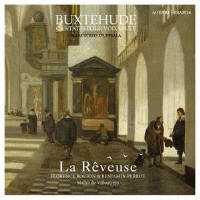Texte paru dans: / Appeared in: |
|
|
Outil de traduction ~ (Très approximatif) |
|
|
Reviewer: David
Reznick
As we know, Both Bach and
Handel visited Buxtehude in Lübeck; and either might have ended up as his
successor, except that doing so included marriage to Buxtehude’s daughter. I
don’t know how this story came down across the centuries, but it certainly
puts the lady at a disadvantage, especially since as far as I know, no
picture of her exists. (Neither Bach nor Handel were matinee idols, by the
way.) But I first became aware of Buxtehude the composer in high school and
I’ve been a fan ever since. He was basically forgotten until the early 20th
century, when the music on this CD was discovered. Had his music been better
known, the Baroque era would probably be thought of as the age of Bach,
Handel, and Buxtehude. Lübeck was once an important city, the capital of the Hanseatic League. But by the time Buxtehude settled there, all that was a thing of the past. As Jeremiah lamented about Jerusalem, it had become a tributary. From the excellent and readable notes that accompany the disc, we get a hint of life in Lubeck from Louis XIII’s ambassador, who reported “… the women here think only of their households: The mothers do the housework, and the daughters sew and make lace. Everything in these homes is chaste and well-ordered; a coquette would be a monster there; therefore, no one reads novels, which are the perdition of youth. (Note: It certainly was true in my case—DR.) No one is acquainted with cards….” So we can get an idea why Lübeck was not a major tourist attraction. But such an insular atmosphere is utterly missing from Buxtehude’s benign and devout music. The compositions here are a sort of mini-cantata, with soloists, chorus, and orchestral interludes, both from Buxtehude and the lesser lights, whose music sounds a lot like his. The entire concert is given an ideal performance by the wonderful chamber group La Rêveuse. This music is a feast for the soul; and as an extra added attraction, after having read the notes, you will finally learn the fate of Buxtehude’s daughter, spurned by two of history’s greatest composers.
| |
|
|
|
|
Cliquez l'un ou l'autre
bouton pour découvrir bien d'autres critiques de CD |
|




